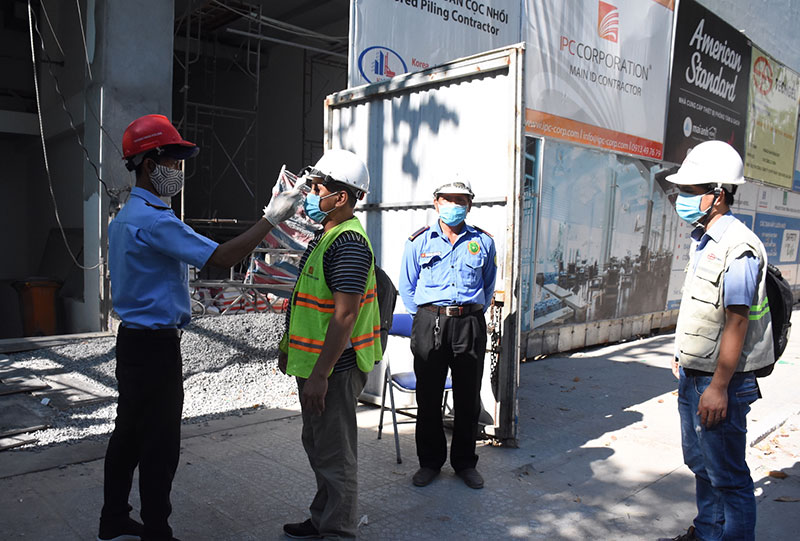
Da Nang Airport - Photo for illustration (Source: thanhnien.vn)
The information was released by Head of the CAAV Dinh Viet Thang.
As one of the most favoured tourist attractions of the country, Da Nang has been receiving a large number of tourists after Vietnam lifted social distancing measures and bolstered domestic air travel.
Given that the city confirmed new infections in the community, the National Steering Committee for COVID-19 Prevention and Control has proposed restricting vehicles of public transport from/to Da Nang and only allowing two flights per day from domestic airports.
Once approved by the Prime Minister, the proposal will take effect at the stroke of July 27th, Thang said.
The Da Nang International Airport is temporarily closed to international flights that carry foreign experts and Vietnamese citizens in an effort to prevent the spread of COVID-19.
Vietnam’s newest carrier Bamboo Airways said it will increase number of flights departing from Da Nang on July 26th-27th to meet passengers’ demand.
It also planned to add four flights linking Da Nang with Hanoi and HCM City on July 26th. Passengers are advised to update latest information on the airline’s website and official fanpage.
Vietnam city re-imposes social distancing measures
Da Nang, the largest centrally-run city in central Vietnam, has decided to re-impose social distancing measures after two locally transmitted coronavirus infections were detected.

Social distancing measures applied in Da Nang City (Photo: nhandan.com.vn)
All residents living near the house of the patient confirmed on July 25th in Lien Chieu district are required to have body temperature checked.
The order is set to take effect as of 13.00 July 26th, according to an urgent telegram issued by the Municipal People’s Committee.
The committee requested all agencies, social organisations and educational institutions to strictly implement the Prime Minister’s Decree 19 on COVID-19 prevention and control measures in the new order.
Accordingly, the city requires local residents to frequently wash their hands with soap or disinfectant solution, wear a face mask when going out, avoid gathering more than 30 people and keep a minimum distance of 1 meter from each other in public places.
The city temporarily suspends festivals, religious rituals, sporting tournaments and other unnecessary big events, as well as non-essential services such as amusement parks, entertainment centres, beauty salons, massage palours, bars or dancing halls.
A number of businesses services such as markets and supermarkets, hotels, restaurants are allowed to operate on the condition they must put in place preventive measures. They are required to provide protective equipment for staff, check visitors’ body temperature, supply sanitizer and ensure people keep distance upon contact.
Factories, workshops and transport firms are also required to apply drastic preventive measures in an attempt to protect the health of employees and passengers.
Schools are encouraged to arrange a flexible timetable and disinfect classrooms.
Da Nang has confirmed two coronavirus cases in the community, ending a 99-day streak Vietnam has obtained without new locally transmitted infections.
The Ministry of Health has established three special working groups to help Da Nang stamp out the possible recurrence of the disease in the locality.
The Prime Minister has called on people to stay calm and strictly observe preventive measures.
Da Nang has suspended all international flights to the city in order to focus on epidemic prevention efforts.
Vietnam emerges as the world’s No2 rice exporter
Vietnam has beaten Thailand to become the second biggest rice exporter in the world after the latter decided to slash rice exports due to prolonged drought and strong baht, according to Radio the Voice of Vietnam.
Photo for illustration (Source: baochinhphu.vn)
Statistics show Thailand exported 2.57 million tonnes of rice for 54.2 billion baht in the first five months of the year, decreasing 31.9% in volume and 13.2% compared to the corresponding period last year.
Meanwhile, Vietnam shipped nearly 2.9 million tonnes for US$1.41 billion in the reviewed period, increasing 5.1% in volume and 18.9% in value year on year.
Vietnam has succeeded in selling rice at cheaper prices than Thailand, and it has recently won contracts to export the commodity to key important markets such as China, Hong Kong, the Philippines, and Malaysia.
In addition, Vietnam and the European Union have ratified their free trade agreement (EVFTA), opening the door for more Vietnamese rice to be shipped to the EU.
Those advantageous factors helped Vietnam surpass Thailand to secure its second place just behind India. The country is expected to sell 6.7 million tonnes of rice abroad this year,
Thailand has cut rice export volume due to prolonged drought and strong baht – its currency.
The Thai Rice Exporters Association said the country’s rice export for the whole year 2020 could reach 6.5 million tonnes, a 10-year record low and even lower than the forecast 7.5 million tonnes.
According to experts, Thailand is likely to fall from third to fifth place in the list of global rice exporters in the next decade unless it develops a long-term policy of increasing the competitiveness of its rice.
Africa, which consumes up to 55% of Thailand’s total rice export volume, is eyeing other exporters offering rice at cheaper prices./.